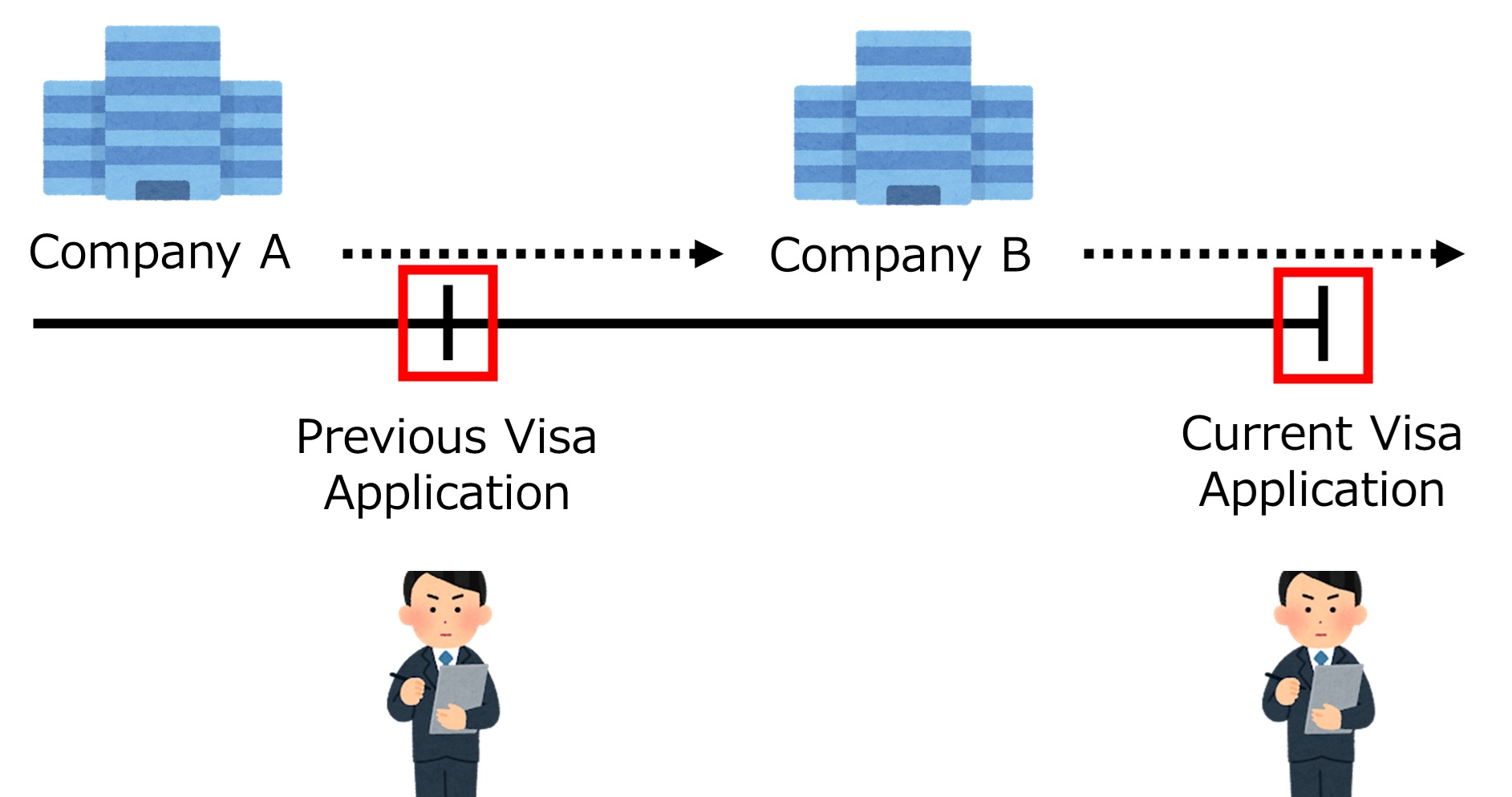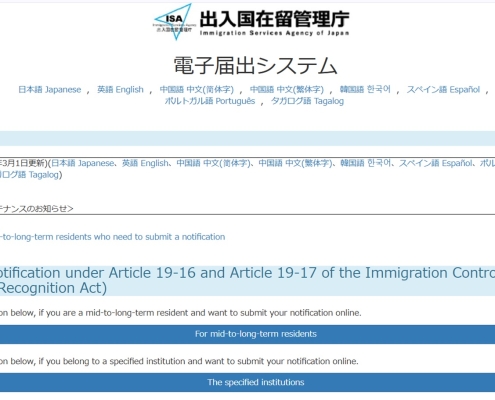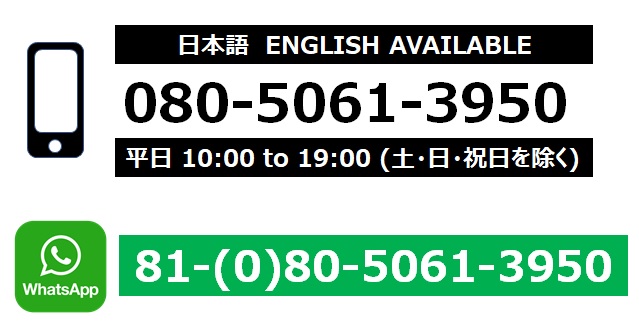11 tips to apply to extend your work visa after the job change in Japan
January 9 2025

目次
- 1 Why is it difficult to apply for your work visa extension after the job change in Japan?
- 2 Benefits of Hiring a Gyoseishoshi Visa Lawyer for the Visa Extension Application
- 3 Points Checked by a Gyoseishoshi Visa Lawyer
- 4 Points Checked by Kikuchi Immigration Services
- 5 Free Consultation
- 6 Consultation with a Fee
- 7 Fees for Visa Support
- 8 English Articles
Why is it difficult to apply for your work visa extension after the job change in Japan?
Work visas, including “Engineer / Specialist in Humanities / International Services” and “Skilled Labor,” grant the residential status for the period of one, three, or five years in general.
You can apply for your visa extension three months prior to the date when your status expires.
If you are working at the same place where your current valid residence card was issued for, the visa extension application usually goes smoothly. However, if you have changed your job, you need to submit more documentation.
It is because the residence card is issued based on the performance/activity of the company you work for, such as its business and stability.
When you change jobs, the immigration bureau needs to determine if there is any problem by reviewing the work at the new company that you have engaged and will engage.

If you have changed your job twice during the period of your stay, the reviewing process will examine both companies where you have been working.
Benefits of Hiring a Gyoseishoshi Visa Lawyer for the Visa Extension Application
When you apply for visa extension with a work visa, you have three options.
With Option 1, you can apply online or in person at the Immigration Bureau.
The online application is not very accessible and many foreign nationals have trouble in navigating through the distinction of character types unique to Japanese (zenkaku and hankaku, or “full-width” and “half-width”).
If you submit the application in person, you need to go to the nearby Immigration Bureau.
Even if you collect all the documents and bring them to the Bureau, it can take time to have the extension granted: for example, two to three hours at the Tokyo Regional Immigration Bureau. Then, it can be another two to three hours until you receive the new residence card.
If anything is missing in the application documents, you will get a mail that requests supplementary materials. You need to understand the unique phrases of the Immigration Bureau and collect the documents by the deadline.
Therefore, if you do not have a lot of time or are not fluent in Japanese, we recommend that you go with Option 2 or 3 and hire a Gyoseishoshi visa lawyer.
Points Checked by a Gyoseishoshi Visa Lawyer
Once you hire a Gyoseishoshi visa lawyer, they will check the following points from a professional standpoint.
1. Is your work at the new company regarded as compatible with the residential status?
First, the lawyer will check if your new work corresponds to the residential status originally granted.
2. Is the company stable?
Judging from the company documents, the lawyer will examine if the company is stable enough to sponsor your stay.
3. Is there any problem in the contract?
The lawyer will check if your current task corresponds to the contract and if the contract is accepted for your application.
4. Did the applicant notify the Immigration Bureau when they left the job and found the new one?
Foreign nationals who stay in Japan with a work visa are obliged to notify the Immigration Bureau within 14 days after they leave their work and within 14 days after starting a new job.
5. Did the applicant report their income from the last fiscal year and pay resident tax?
If you are working at a relatively big company, such as those classified as Category 1 or 2, you are not required to submit the latest Kazei Shomeisho (Taxable Income Certificate) or Nozei Shomeisho (Local Tax Payment Certificate) when you renew your work visa.
Still, all the applications are reviewed on the premise that the applicant has reported income and paid resident tax properly.
Points Checked by Kikuchi Immigration Services
Points <1> through <5> above are main items checked by a Gyoseishoshi visa lawyer office in general.
If you just want to extend your period of stay, it is sufficient to check these points. Yet, our office also examines the following items in case the applicant considers permanent residency (eiju) or naturalization (kika) in the future.

6. Did the applicant have the former company issue the appropriate documentation requested by the Immigration Bureau?
We check if you have the documents from the former company, such as Taishoku Shomeisho or Rishoku Hyo (the certificates of resignation) and Gensen Choshu Hyo (withholding tax slip).
If you have not obtained these documents for some reason, we submit a statement of the reason to the Immigration Bureau.
7. Has the applicant paid contributions for health insurance or pension after leaving the job?
If you had a lapse between the jobs, you may need to enroll in the National Health Insurance or the National Pension. Also, you cannot be covered by the Employees’ Social Insurance if the new company is outsourcing the work to you.
In this case, you need to enroll in the National Health Insurance or National Pension even after the job change.
Since proper tax payment is crucial to apply for permanent residency and naturalization, we check these items as well.
8. Is there any problem with the dependents’ health insurance and pension?
Once the applicant leaves the job, the contributions to the dependents’ health insurance and pension may change.
We make sure there is no problem with the payment for health insurance and pension for your dependents.
9. Is there a new matter to report to the Immigration Bureau since the last time the residential status was granted?
Since the last time when the residential status was granted, you have been overseas for an extended time, you have been unemployed for more than three months between the jobs, you have had trouble with the former company and have not been able to get the documents that certify your resignation.
If you have conditions like these that need to be reported to the Immigration Bureau beforehand, we submit the documents to explain the situation and the statement of reason.
10. Be Mindful Until Your Application is Granted
Currently, it takes two to three months on average for the Tokyo Regional Immigration Bureau to process the application to extend the period of stay.
Once the application is accepted, you will get a stamp that tells the renewal is pending on the back of your residence card. The period of your stay is automatically extended by two months, but once the original card expires, your bank account may be temporarily frozen, or My Number Card may become invalid.
You also need to be careful when travelling abroad, so we share with our clients what to be mindful of until the renewal is granted.
11.When can you apply for permanent residency or naturalization?
When the period of your stay is extended, we provide you with conditions and tips for permanent residency and naturalization for the future prospect.

Free Consultation
Please contact our office first. General questions can be answered by email or on Zoom (up to 30 minutes) free of charge.
You can use the following form for free consultation.
Consultation with a Fee
Individual and specific questions can be addressed in person or on Zoom for JPY 11,000 per hour.
You can use the following form for consultation with a fee.
Fees for Visa Support
































